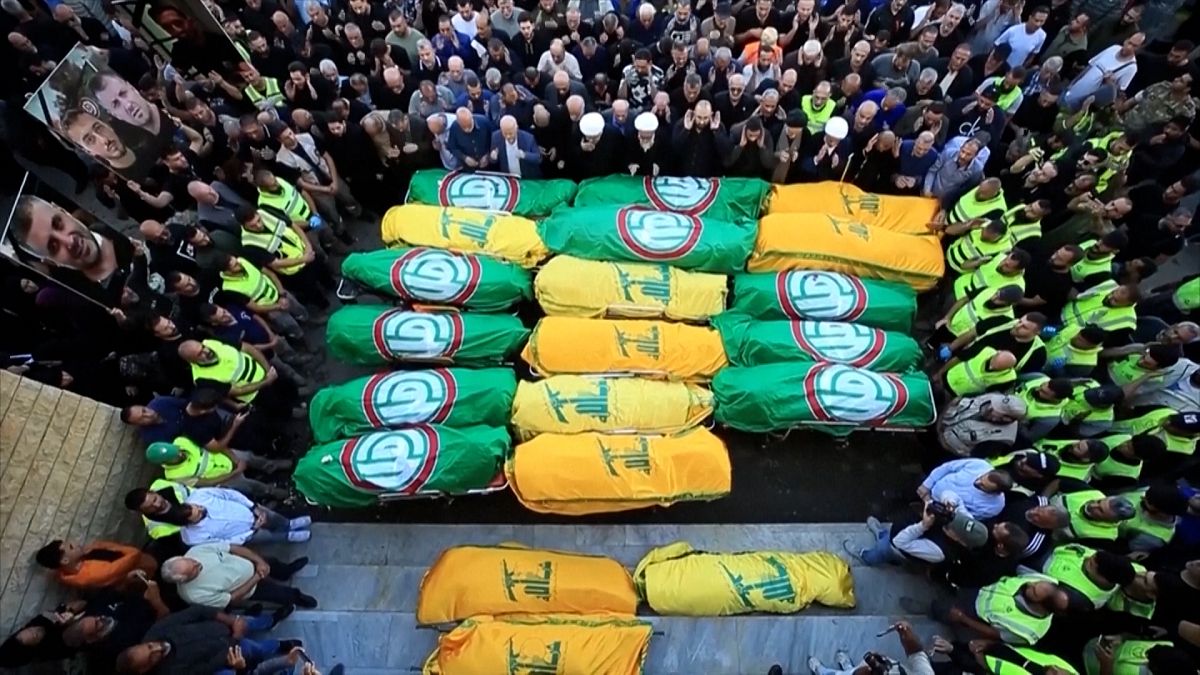A tragic incident occurred in Lebanon on Saturday, resulting in the deaths of eight paramedics and two civilians. These individuals were killed as a result of an Israeli airstrike targeted specifically at paramedic gathering points in Deir Qanoun and Ain Baal in Tyre. The loss of these lives has added to the already staggering death toll of over 3,000 people, with an additional 14,000 individuals sustaining injuries due to the ongoing conflict between Israel and Hezbollah. The Lebanese Ministry of Health further reports that 1.2 million people have been displaced as a result of the violence, with over 100 health professionals also losing their lives in the line of duty.
In response to this tragic event, a group funeral was held to honor and mourn the eight paramedics and two civilians who lost their lives. The community came together to pay their respects, highlighting the devastating impact that the ongoing conflict has had on the people of Lebanon. The loss of these individuals underscores the dangers that health professionals face in conflict zones, as they work tirelessly to provide care and support to those in need. The funeral served as a somber reminder of the sacrifices made by these brave individuals in the face of such violence and uncertainty.
The Lebanese Ministry of Health has been working tirelessly to address the impact of the conflict on the country’s healthcare system. With over 100 health professionals losing their lives and many hospitals and health centers sustaining damage, the ministry is faced with significant challenges in providing care to those in need. The displacement of 1.2 million people has further strained healthcare resources, making it difficult for individuals to access essential medical services. Despite these challenges, health professionals continue to work tirelessly to provide care to those affected by the conflict, demonstrating their unwavering dedication to their work and the well-being of their communities.
The ongoing violence in Lebanon has taken a heavy toll on the country’s population, with over 3,000 people losing their lives and 14,000 individuals sustaining injuries. The displacement of 1.2 million people has further exacerbated the humanitarian crisis, leading to shortages in essential services such as healthcare. The loss of over 100 health professionals has further strained an already overwhelmed healthcare system, making it difficult for individuals to access the care they need. Despite these challenges, the Lebanese Ministry of Health is committed to providing support to those affected by the conflict and ensuring that healthcare services are accessible to all.
The international community has a vital role to play in supporting Lebanon during this challenging time. As the country grapples with the devastating impact of the conflict, it is essential that countries and organizations provide both financial and logistical support to help rebuild the healthcare system and provide assistance to those in need. By working together, we can help alleviate the suffering of the Lebanese people and support the efforts of health professionals who are working tirelessly to provide care in the face of such adversity. It is crucial that we stand in solidarity with the people of Lebanon during this difficult time and offer our support however we can.
In conclusion, the deaths of the eight paramedics and two civilians in Lebanon serve as a tragic reminder of the toll that conflict can take on a country’s population. The loss of these individuals highlights the risks that health professionals face in conflict zones and underscores the importance of supporting those who provide care to those in need. The Lebanese Ministry of Health is working diligently to address the impact of the conflict on the healthcare system, but they cannot do it alone. The international community must come together to support Lebanon during this difficult time and ensure that healthcare services are accessible to all who need them. By standing in solidarity with the people of Lebanon, we can help alleviate their suffering and support the efforts of health professionals who are working tirelessly to provide care in the face of such adversity.










